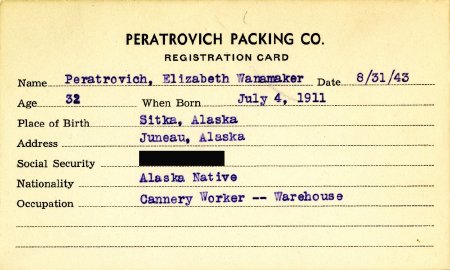Description:
Activist and Cannery Worker
The Peratrovich Packing Co. cannery in Klawock caught fire and burnt to the ground in 1943. Miraculously a safe in the theatre survived the fire and preserved employment records for 390 cannery workers. Information about cannery workers is not common and these records offer great information, like who worked for the cannery, where they came from, and what their jobs were. Included in the roster were pioneering civil rights activist Elizabeth Pertatrovich and her husband Roy, who was the son of cannery owner Giovanni (John) Peratrovich.
The couple spent about a decade in Klawock growing their family, working for the cannery and at various jobs in the village, and becoming involved in social organizations like the Alaska Native Brotherhood and Alaska Native Sisterhood. Moving to Juneau in 1941, the Peratroviches encountered racial discrimination and their experiences with it ultimately led to advocate for anti-discrimination laws, first in 1943 and culminating with Elizabeth's now famous testimony before the Territorial government two years later. Her employment record indicates that in between these activities, Elizabeth returned to the family business in Klawock and worked at the cannery warehouse.
Governor Ernest Gruening signed the Anti-Discrimination Act into law on February 16, 1945, long before Martin Luther King Jr. led the charge for civil rights in the racially divided south. In Alaska, February 16 is now celebrated as Elizabeth Peratrovich Day to honor her profound influence in our state. In February 2020, the U.S. Mint will release a $1 coin design featuring Elizabeth to celebrate the 75th anniversary of this landmark legislation.
Ketchikan Museums, KM 2019.2.5

